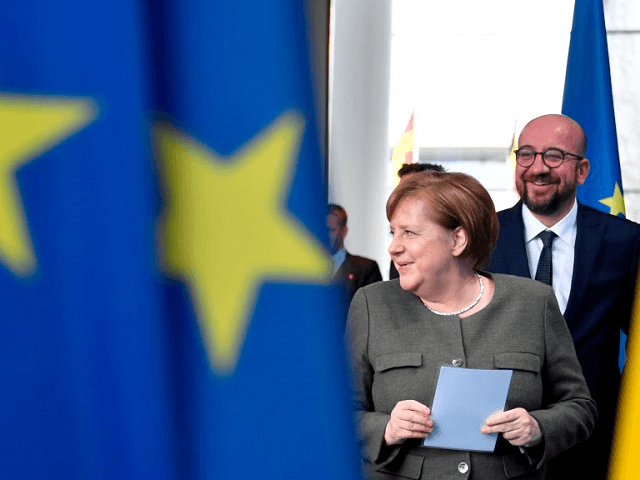Sir Paul Lever, the former UK ambassador to Germany, said in an interview Friday that Brexit will have little real impact on the European Union (EU), which is overwhelmingly controlled by Germany.
Citing a recent study by the Germany-based Centre for European Policy Studies, Lever told Spiked that Germany had earned some €1.9 trillion from adopting the euro in its first 20 years, while France had suffered a loss of €3.6 trillion and Italy a loss of €4.3 trillion from switching to the euro.
“German politicians don’t like to admit this,” said Sir Paul, who was the British ambassador to Germany between 1997 and 2003.
Asked how central Germany is to the European Union, he said that the EU itself was structured following the German model.
While many mistakenly believe that the EU is run by the French, “actually it’s run on a German paradigm. The EU is Germany writ large,” he said.
“And this is how it has been from the beginning. It is not some recent German plot to subvert the EU – it is how it was set up,” he added.
The actual structures of the EU, including the Commission, the European Parliament, the Council of Ministers, and the European Court exactly mirror Germany’s own government structure, Lever said, which is “why the Germans find it so easy to operate in Europe,” said Lever, who worked in the EU Commission in the 1980s.
Sir Paul also said that the UK’s exit from the EU will have little real impact on the power balance or operations of the EU, since in key ways the UK has always been extraneous to them. Germany, the richest, most populous, and most powerful nation in the bloc will continue to rule the roost.
“The two things that currently matter in the EU, and the things that most matter to Germany, are the Euro and immigration. Since we’re not in the Euro and we had opted out of Schengen, Britain’s voice hasn’t been relevant for years on the two most important issues,” he said.
All of this means that while Britain’s departure will undoubtedly be felt, the EU “won’t change fundamentally,” he said.
“Brexit won’t have an existential effect on the EU,” he said.
And whereas the French “will probably feel that Brexit will enhance their authority within the EU,” in reality, the Germans will continue to successfully oppose all French initiatives that do not represent German interests, Lever said.
This means that regarding “anything that involves a bigger EU budget, a Eurozone budget or giving German taxpayers responsibility for the creditworthiness of other countries, the answer from Germany is no,” he said.
German politicians say one thing about the EU but their actions do not always correspond to their words, he proposed. If one looks at how the Germans have actually behaved over the years, “they push for policies that suit Germany and are opposed to policies that hurt the German taxpayer.”
While there is nothing wrong with pursuing one’s national interest, “Germany never admits that this is what it is up to,” Sir Paul said.
He also said that over the years, the European Parliament has increased its power unchallenged, and “most national governments were happy with that.”
The problem is, he suggested, that the European Union is not a democratic political structure.
“Everybody assumed that a directly elected chamber would make it democratic, but for democracy to work there has to be a demos – an electorate, a group of people who feel sufficient commonality with each other to accept majority decisions. But there has never been a ‘European people,’” he said.
“Regardless of this, it has sought to extend its own power ever since,” he added.
Regarding the recent rise of populist governments, Lever said that in Germany things are a little different than in the rest of Europe.
“In Germany, the word populism is used in a very pejorative sense, as if there is something inherently unworthy about a party that appeals to public opinion in a new way,” he said, adding, “I don’t buy that, at all.”
“Undoubtedly, AfD is tapping into a genuine well of public opinion on immigration, on Islam and to some extent on the EU,” he said.
“Call it populist if you like, but this isn’t 1933. This is not Hitler,” he said.
Follow Thomas D. Williams on Twitter Follow @tdwilliamsrome

COMMENTS
Please let us know if you're having issues with commenting.